Best Time to Visit Barcelona.
Compared to many other places globally, have you ever wondered why Weather Forecast Barcelona is often inaccurate? How can it be so in this day and age? So when is the best time to visit?
A straightforward answer to all weather-related questions for Barcelona is impossible; the subject is vast, and my knowledge is limited. However, I am happy to share some of my observations as a sailor living in Barcelona for several years. I hope my experience answers your basic questions on the subject.
“Google”. “Weather Forcast Barcelona.” or “weather forecast Barcelona best time to visit.”
I can answer that general weather question if it refers to late spring or early summer. ” The Weather in Barcelona is amazing“! Any other time apart from mid-summer, when it’s hot hot hot, is excellent! The weather forecast for Barcelona and the surrounding area is incredibly complex, so change your “Google” question to “Weather Forcast Barcelona City Centre” (or district). This will work better as It’s impossible to generalise all areas in Barcelona.

A few basics might help you understand my point.
When discussing the Weather forecast in Barcelona, we should consider this a general statement covering an area of more than 100 kilometres. Only in summer can a forecast be nearly correct for every Barcelona area.
More about weather forecasting in Barcelona.
Long summer days when weather systems follow a regular pattern in Spain are not particularly interesting. Hot summers on the beach anywhere in Catalonia can be enjoyed and predicted by everyone. Winter weather in Barcelona and surrounding areas is fascinating. To make a point in this post, let’s skip summer forecasting.
Autumn in Barcelona.
At the end of summer, the weather transforms overnight from very settled and predictable to often violent, with a much more complex mood as the first snow falls across the Pyrenees. After the snow, winds and storms across the area are massively affected by ice-cold air descending from the mountains. That air crashes into the warm air rising from the Mediterranean Sea. The winds are called mistral and affect many parts of southern France. They play havoc with incoming weather systems even during the summer months, as the air on the top of the mountains is always chilled. Roses in Northern Spain and the coast road in France near Spain’s border often have strong wind warnings even when the weather is relatively calm a few miles away.
September 2020 saw headlines appearing announcing the onset of early snow in the Pyrenees, a sure sign of a long cold winter in Barcelona.
“Early snowfall during September 2020 across French mountain ranges.”
 Snow has fallen in the Pyrenees very early this year, causing temperatures to drop significantly, leaving a “remarkable” amount of snow forcing some roads to close.”
Snow has fallen in the Pyrenees very early this year, causing temperatures to drop significantly, leaving a “remarkable” amount of snow forcing some roads to close.”
So, we can blame the early snow in the Pyrenees for the long cold winter in Barcelona! It might be possible to correctly track the weather events that triggered this unpredicted snowfall in September 2020. Indeed one might even look deeper and consider the weather patterns associated with El Niño and global warming.
What is El Niño?
El Niño is the name given to the warm phase of the Global Southern Temperature Oscillation associated with a warm ocean water band. Simply put, El Niño is a cycle of warm and cold sea surface temperatures (Warm water develops in the central and east-central equatorial Pacific).
As a result of the El Niño effect, all places on Earth have varied winters every few years. All other factors, including global warming, must be dropped into the weather mixing pot, resulting in an ever-changing and complex subject exaggerated greatly by local sea temperatures.
Local conditions are affected by the sea.
Let’s look at the bigger picture again, affecting the Mediterranean Sea. We all know that the oceans are affected by the moon’s daily gravitational pull. This effect is as it passes over us, and to a lesser degree, the sun’s track relating to the moon. Before you think I have lost the plot, please stay with me. We will get back to Barcelona’s local weather in a moment!
I am sure you know the sun and moon have little effect on tidal flows in the Mediterranean. This lack of tidal flow in the Mediterranean happens because the land is less attracted to the sun or moon. Therefore, as we do not have such a tidal water flow in the Mediterranean, temperatures remain much more contained (The water stays warmer for longer).
When the warm Mediterranean Sea air rises towards the land, it meets Icy cold air falling from the fresh snow on the Pyranise Mountains. The energy created from this event creates localised storms, particularly over Barcelona and Spain’s lowlands.
Global weather systems
High and low-pressure weather systems generally formed over the oceans travel the globe. As they circulate, powerful low-pressure forces bully dominant high-pressure systems. When all forces are mixed with local wind, forecasting must be very localised to be accurate at a given time.
Barcelona is not unique, but temperatures and weather vary massively in populated local districts.
To summarise, when considering a forecast request to “Google”. In the winter months for Barcelona, consider asking a more localised question. Remember, in Castelldefels or Sitges (south of the city centre), the weather can differ significantly from that found in Barcelona’s centre. Varied weather is one of the attractions of sailing in the area. Generally, we have excellent wind and warm days. Severe storms at sea usually happen during the winter months and are dangerous. If you plan to sail during the winter months in the Mediterranean, please look out for rapidly developing thunderstorms. Severe weather along coastal areas in Catalonia can quickly develop occasionally; forecasting is wrong.
About us / Testimonials / Sell Your Boat / Boats For Sale / News Posts / Boats For Sale News Post / Yacht For Sale Posts / Boat Maintainance Posts / Spain information Posts / Living on a boat Posts / Marina Berth for Rent Spain / Yacht Brokers Job Posts / Join Us / Yacht Syndicate /
 Corredors de iots
Corredors de iots

 brokerage. Generally, yacht values have increased during the last six months. This is not the case for vessels that have not been maintained. Buyers want to see service history more than anything, so if you’re asking for the top-price boat, please ensure maintenance is up to date, and then you stand a good chance of selling.
brokerage. Generally, yacht values have increased during the last six months. This is not the case for vessels that have not been maintained. Buyers want to see service history more than anything, so if you’re asking for the top-price boat, please ensure maintenance is up to date, and then you stand a good chance of selling.

 Many years ago, we took a beautiful Jeanneau 43 DS Yacht in exchange for a new Jeanneau 47 Ds. The 43 was in Palma Majorca, Spain. Part of the deal being we collected the PX and shipped it back to the base in North Wales. The deal was done, so we flew to Mallorca to collect the yacht. We sailed her back to Northern Spain, where she was collected by truck and delivered to the UK.
Many years ago, we took a beautiful Jeanneau 43 DS Yacht in exchange for a new Jeanneau 47 Ds. The 43 was in Palma Majorca, Spain. Part of the deal being we collected the PX and shipped it back to the base in North Wales. The deal was done, so we flew to Mallorca to collect the yacht. We sailed her back to Northern Spain, where she was collected by truck and delivered to the UK.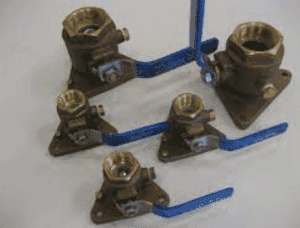 the fault more quickly was leaving the marina. It was impossible not to motor against a strong incoming tide until fifteen minutes after leaving the berth. One might motor for half an hour on a bad day until sufficient water was under the keel, allowing the engine to be extinguished. My point is the engine was always running, so it was difficult to isolate the problem. The strange thing was that when the yacht sat for extended periods, the bilge stayed bone dry.
the fault more quickly was leaving the marina. It was impossible not to motor against a strong incoming tide until fifteen minutes after leaving the berth. One might motor for half an hour on a bad day until sufficient water was under the keel, allowing the engine to be extinguished. My point is the engine was always running, so it was difficult to isolate the problem. The strange thing was that when the yacht sat for extended periods, the bilge stayed bone dry.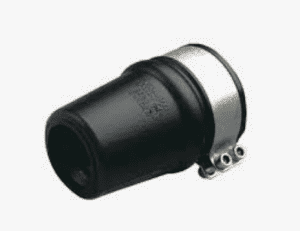 little, but I had to find the cause. Another conversation with the old owner confirmed my suspicions that this problem had been around since the yacht was built. I had paperwork evidence that the flexy exhaust system had been changed under warranty. This had not resolved the issue.
little, but I had to find the cause. Another conversation with the old owner confirmed my suspicions that this problem had been around since the yacht was built. I had paperwork evidence that the flexy exhaust system had been changed under warranty. This had not resolved the issue.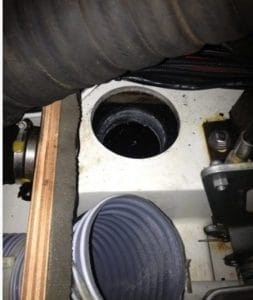 silencer is not visible without removing even more floor sections, and what a job that was! Not convinced it was leaking, eventually, we decided to remove it to examine the underside of the engine. It’s not an easy job to get it out, but finally, out she came. Absolutely nothing to see!
silencer is not visible without removing even more floor sections, and what a job that was! Not convinced it was leaking, eventually, we decided to remove it to examine the underside of the engine. It’s not an easy job to get it out, but finally, out she came. Absolutely nothing to see!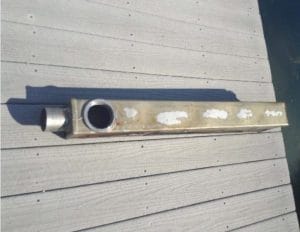 Now we get to the point of telling you this story. As it happens, the mystery was not confined to our yacht. I helped another dealer who was having a nightmare with a client. The same sort of problem, a tiny leak, but not when the yacht sat idle, so it was tough to diagnose the problem.
Now we get to the point of telling you this story. As it happens, the mystery was not confined to our yacht. I helped another dealer who was having a nightmare with a client. The same sort of problem, a tiny leak, but not when the yacht sat idle, so it was tough to diagnose the problem.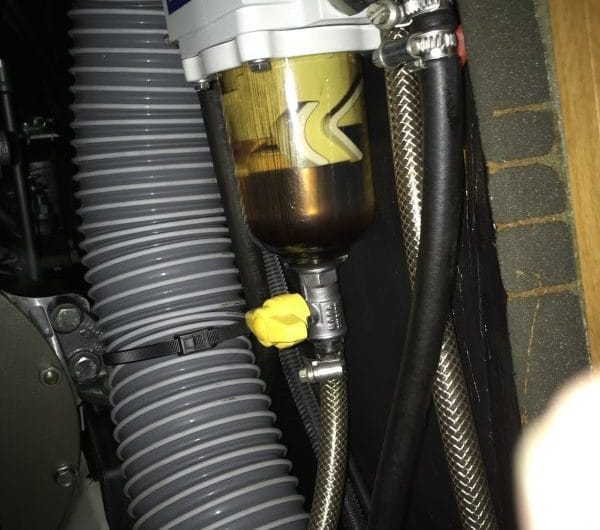
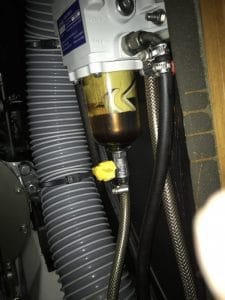 market; it takes little research to find a good one. Diesel bug treatment is not a long-term fix, so you must know if the problem reoccurs. My suggestion will warn you about diesel bug infection and save you the inconvenience of sampling fuel during your daily engine checks for water contamination, the other major cause of boating breakdowns.
market; it takes little research to find a good one. Diesel bug treatment is not a long-term fix, so you must know if the problem reoccurs. My suggestion will warn you about diesel bug infection and save you the inconvenience of sampling fuel during your daily engine checks for water contamination, the other major cause of boating breakdowns.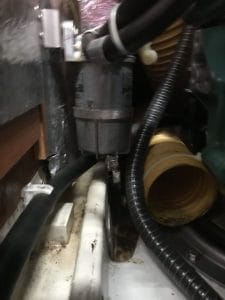 If you are happy to sample a small amount of fuel from a canister-type filter, that’s your choice, but remember, every time you open the fuel system to drain down a sample, you will potentially allow air into the fuel system (and that’s not good). The other big no-no about taking a sample is Diesel stinks; it’s like fixing your bike in your home’s kitchen. To see half a litre of fuel without disturbing it or contaminating the results within a glass bowl is so simple. This is the fastest way to ensure you have no worries about the fuel supply on your boat. A glass bowl water trap can also be the first item to look at if your engine starts to stutter. If you get water in the fuel, it will show up in seconds.
If you are happy to sample a small amount of fuel from a canister-type filter, that’s your choice, but remember, every time you open the fuel system to drain down a sample, you will potentially allow air into the fuel system (and that’s not good). The other big no-no about taking a sample is Diesel stinks; it’s like fixing your bike in your home’s kitchen. To see half a litre of fuel without disturbing it or contaminating the results within a glass bowl is so simple. This is the fastest way to ensure you have no worries about the fuel supply on your boat. A glass bowl water trap can also be the first item to look at if your engine starts to stutter. If you get water in the fuel, it will show up in seconds.
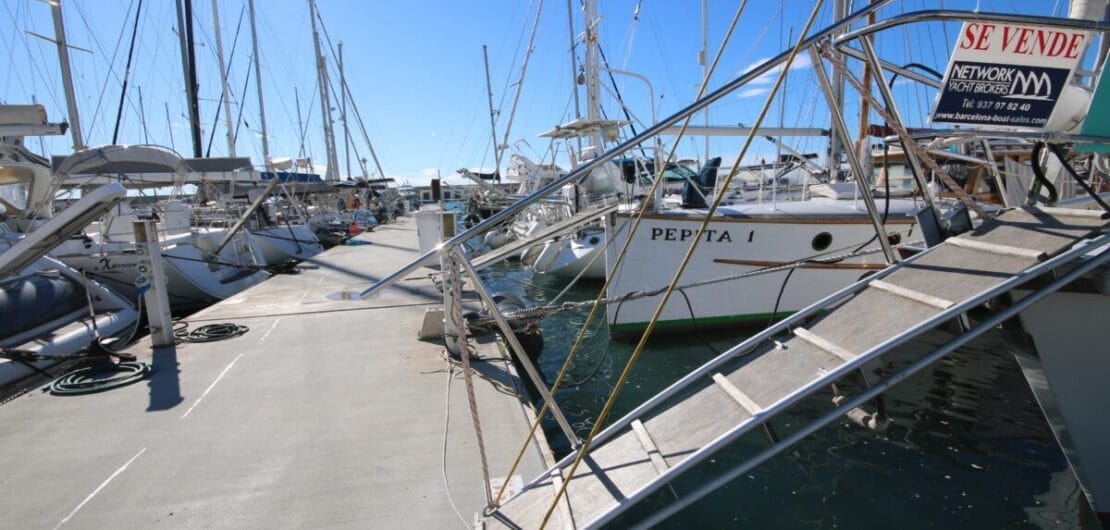




 Some say the marketing phrase “location location location” is used to death in the property world. Is it? Your business and home location are critical to success and happiness; moving is never straightforward and can prove financially crippling once you commit to a mortgage or rental contract.
Some say the marketing phrase “location location location” is used to death in the property world. Is it? Your business and home location are critical to success and happiness; moving is never straightforward and can prove financially crippling once you commit to a mortgage or rental contract.
 A busy marina is hard to get into, or at least that’s what you think. Suppose I told you that I have never been refused a berth in a Marina at any time. I have
A busy marina is hard to get into, or at least that’s what you think. Suppose I told you that I have never been refused a berth in a Marina at any time. I have 
 holds this City title, but for many years
holds this City title, but for many years 

 Flag registration yachting and boating, the question is, are you flying a legal flag on your yacht? Perhaps the first question to ask yourself is, “Do I have a passport that matches the flag I fly? If the Answer to that question is “yes”, then you are probably ok.
Flag registration yachting and boating, the question is, are you flying a legal flag on your yacht? Perhaps the first question to ask yourself is, “Do I have a passport that matches the flag I fly? If the Answer to that question is “yes”, then you are probably ok. me answer the question for you. If you’re a boat owner whose passport does not match your flying flag, “it’s getting foggy, and you could be in shallow water”.
me answer the question for you. If you’re a boat owner whose passport does not match your flying flag, “it’s getting foggy, and you could be in shallow water”. registration does not offer the same legal protection as flag registration. The Dutch registration for boats and yachts is merely a register. The Dutch register is a privately owned company operating as a commercial venture; nothing wrong with that or using the register. Therefore, you might be ok if you do not intend to cruise Italy, Portugal, Spain, or outside Europe where the register is not recognised.
registration does not offer the same legal protection as flag registration. The Dutch registration for boats and yachts is merely a register. The Dutch register is a privately owned company operating as a commercial venture; nothing wrong with that or using the register. Therefore, you might be ok if you do not intend to cruise Italy, Portugal, Spain, or outside Europe where the register is not recognised. with a Dutch-registered vessel, you are sailing into tricky waters.
with a Dutch-registered vessel, you are sailing into tricky waters.

